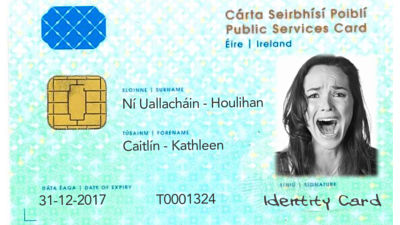Dublin, 19 July 2019
The Irish Council for Civil Liberties (ICCL) recently surveyed 164 bodies who are directly or indirectly listed as bodies with permission to use the Public Services Card (PSC) under the Social Welfare Act. Of those who responded, 91% said that their office did not specifically benefit from the PSC. 73% said they had no further intention of implementing it, while 9% said they would seek to limit any further roll-out of the card. One government agency explicitly noted that it had privacy concerns about the PSC.
Elizabeth Farries, Information Rights Programme Manager at ICCL, said:
People all across Ireland have been contacting us trying to figure out how their data will be used if they get a PSC, or whether they can use other forms of ID for certain services. They are coming up against huge obstacles trying to find even the simplest information so we decided to conduct a survey of the bodies allowed to use it to find out. However, we came up against the same lack of clarity and, in some cases, complete ignorance about the system.
ICCL is deeply concerned that the card may be illegal and also that it impacts disproportionately on those living in poverty. We have invited the UN Special Rapporteur on Extreme Poverty, Philip Alston, to speak in Dublin on 29 July about this latter point.
Of 164 bodies surveyed, only 42 responded. This reflects the general opacity surrounding the card and at ICCL we were concerned but unsurprised by the low response rate. We have been calling on the Data Protection Commissioner to release its report on the PSC since the beginning of the year. Helen Dixon recently spoke scathingly about the card at a private conference in Israel.
Ms Farries continued:
The existence of this survey at all is a reflection of the fact that our previous attempts to access information which should be publicly available have been repeatedly rebuked. This includes our request that the Data Protection Commissioner publish their report, in its entirety, into the legality or lack thereof of the PSC.
A worrisome tendency we observed was the contradictory nature of the responses we received. One body responded multiple times, first to say that they did not use the PSC, then followed up with an addendum to say they could, and finally clarifying that they do, indeed, use the PSC.
This confusion reflects confusion we have heard from individuals who have contacted us. In one example, a person was required to produce a PSC in order to receive a passport. After clarifying that other forms of ID would be accepted, this person later received information that they would, in fact, need a PSC after all. Following an appeal, the person remains without a passport and with little information as to why this is the case.
We are also troubled by the lack of understanding of the system evidenced by the responses. Some bodies responded to say that they did not require the PSC at all but acknowledged that they required a verified MyGovID for certain services. Given that a prerequisite of the verified MyGovID is a PSC, then the PSC is indeed a requirement for anyone wishing to avail of these services.
ENDS/
For comment or queries
Sinead Nolan: sinead.nolan@iccl.ie, 087-4157162
We can’t do this work without support. Please consider donating.

